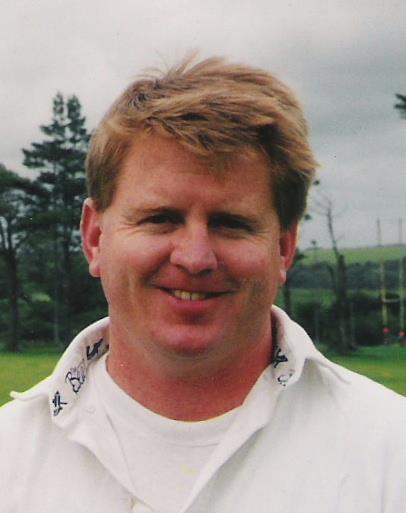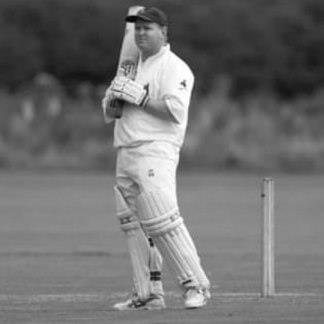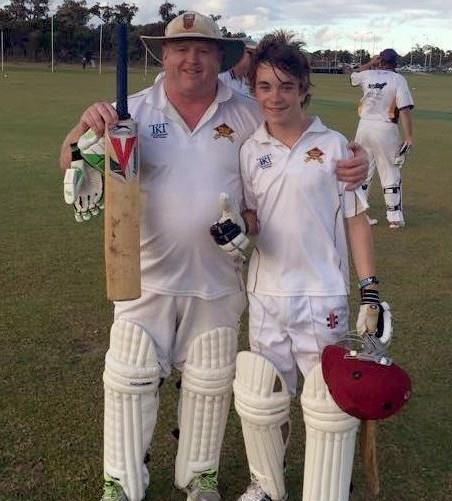Aussie Dave Lovell created a huge impact in Pembrokeshire cricket with Lamphey CC

Our latest feature comes curtesy of Fraser Watson and in it he has been speaking to the Australian cricketer Dave Lovell, who created such an impact in the time that he played for Lamphey and helped take them to the very top of the Pembrokeshire Cricket tree:
So then, who’s the best player to have graced Pembrokeshire cricket?
It’s a pretty open ended debate and of course, there’s no definitive answer. The elder generation will band about names like Peter Hall, Jackie Capon, and Barry Wood (all with justifiable reason) while in recent times, the likes of Simon Holliday have come into the equation.
That group barely scratches the surface though. Many others would be in contention and in truth, your answer would heavily depend on personal preference and the era you played in.
But here’s one safe bet. No individual has ever had such a devastating short term impact as the man who spoke to me from the serene comfort of his home in Western Australia this week.
Dave hit the local cricket scene 25 years ago
It’s almost 25 years since Dave Lovell joined a Lamphey side that was then targeting promotion from Division Two. And sure enough, he was the epitome of how Australian players were perceived on these shores in the 90s.
He was straight talking. He was hard-nosed. He was sociable. And above all, he was bloody good at cricket.
And in the six years that followed, to say his quality helped The Stags upset the apple cart would be a ludicrous understatement.
But those who knew his pedigree prior to his debut Pembrokeshire season in 1996 could see what was coming. As a teenager, Lovell was paid to play representative cricket in Perth. At the age of 18 he was excelling in the Australian Under 19s Championship as an opening batsman and a year later, he headed for England.
Superb CV built up
Three trophy laden seasons in the Yorkshire Leagues followed with Batley CC. In 1990, Lovell’s batting total of 1,120 runs (at 65.88) topped the league averages by some distance. He then went on to score 1,000 runs for Windhill in the Bradford League in 1992 but in the meantime, opportunities were passing him by.
And there was nothing he could do about it.
“My dad was born in Manchester, so I had a British passport,” he explained.
“But in cricket terms I had to do a four year course before I could become a professional English player, a rule that doesn’t exist now. It was really disappointing because counties wanted me to play for them and I couldn’t.”
In season five though, a chance duly came.
Finally finds a place with Derbyshire
Lovell signed for Derbyshire but fate worked against him during an injury-plagued three years, including a knee problem that would later require a string of operations.
A short stint at Warwickshire followed after a call from good friend and then England international Dermot Reeve - where Lovell notched three centuries at second team level. He would also go on to hit a century for Glamorgan 2nds and play regularly for Wales minor counties.
 First class cricket’s loss – Lamphey’s gain
First class cricket’s loss – Lamphey’s gain
Despite this, the break into regular first class cricket never quite came. And one man in particular sought to capitalise.
John Green had started a mission to drive Lamphey to the top of Pembrokeshire cricket, with recruiting overseas players a big part of the process.
Vasbert Drakes, Brett Johnson, and Geoff Cullen were already making an impact when Green effectively added the final piece to the jigsaw.
“I first met John at Derbyshire when Vasbert was playing. I got on well with him straight away and we managed to organise an invitational game against Glamorgan at Lamphey. It was awesome day.”
Felt at home straight away
An offer was made and accepted. And for Lovell, who by this point had already met his now wife Sharon, Pembrokeshire literally felt like home.
“Again I was living in the west part of a country and it reminded me of where I came from in Australia. I spent the first few weeks driving to places like Newgale and Tenby and the countryside was beautiful – I had the freedom of outdoor living again.”
And the freedom of the batting crease too. By the time Lovell made his Lamphey bow the 1996 season was already underway. Let’s just say he made up for lost time.
His top score in that campaign was 219 against Haverfordwest 2nds, and his spin bowling took a stack of wickets to boot. The Stags went up as champions, and the man who already had everyone talking was installed as captain.
“The standard in Division Two was pretty average to be honest. Division One was a big step up in quality.”
Four seasons of ruthless play
In the four seasons that followed Lovell was ruthless, both with his batting and captaincy, and his team followed suit. There were flashpoints and moments of confrontation, but what resonated with local cricketers the most was his ability to bat with such power and precision he often appeared to be toying with fielders.
In those four seasons, Lamphey won two league titles and made three straight Harrison-Allen Bowl finals, winning the latter two – and captured two Jubilee Cups. In each campaign, Lovell amassed more than 1000 runs while continuing to take wickets.
Bowl Finals linger most
But it’s the Bowl finals which linger most in his memories.
“Those were such special days at Cresselly,” he said.
“I’d played in front of crowds of 7000 people but the Bowl finals are still the best games I’ve played in. The first one we lost but I remember it fondly as it was such a special day and it was a privilege to be involved.
“Hats off to the Harrison-Allen family but the one thing I never realised was how bloody expensive the trophy was. When we first won it we were drinking out of it in Tenby before someone pointed out we’d had to give it back in one piece.
Great team spirit at Lamphey
“But they were good days and the people of Lamphey appreciated it. We weren’t as big as clubs like Haverfordwest, Carew, or Cresselly, but had a great team and I still have friends there who will say those years were the best of their lives.”
And yet it says much for Lovell’s drive and passion for cricket that despite the success, the lack of one other trophy still haunts him.
“We won everything but the Duggie Morris and I really wanted that one.
“I used those games to give young guys a chance and I batted down at 6 or 7 and didn’t contribute as much – and I wonder now if that was the right thing to do. But our main focus was always the league and the Bowl.”
High coaching skill levels paid off
It wasn’t just on the field where Lovell was making an impact though. He spent time coaching youngsters from around the county in the indoor centre in Milford Haven. His methods differed from what many were used to in our county, but they were effective.
Indeed, I attended sessions with him as part of the Llanrhian junior set up and was caught fooling around one night. After a word or two from Lovell, I didn’t fool around again.
When he talked, you listened. And when you listened, you learnt something.
“I’ve only ever known one way.
“I could see that not enough juniors in Pembrokeshire had experienced a hard line of coaching. It wasn’t about being aggressive or bullying anyone but as a coach you should be able to tell people off and it’s up to them to take it on board and come back.
“But because I had been there and done it I was respected and most would listen – and I loved coaching them. Volunteers in cricket are precious so you can’t criticise them but places like Pembrokeshire could really benefit with former professionals giving something back.”
This is where our authorities missed a trick. Lovell’s style, in his words, put ‘noses out of joint’ and the coaching role wasn’t to last. Take it from me, it was the youngsters that lost out.
Sadly, unsavoury end to his Pembrokeshire days
And in 2001, came the beginning of the end of Lovell’s playing days in our county, and in unsavoury fashion.
By this point resentment had built up in many quarters. Lamphey were being viewed as the big spenders spoiling local cricket. And Lovell’s prolific form was deemed central to that notion.
“Without doubt there was jealousy,” said Lovell, with no hesitation.
“What I always found funny was the big clubs that were complaining had all asked me to play for them. The hierarchy were rattled - instead they should have taken the challenge.”
In that campaign, he’d racked up a staggering 996 runs in 11 innings at an average of 199.6 – including four tons and two not outs in the 90s. But he was then reported to the County Club after a verbal exchange in a game against Kilgetty – and a controversial two month ban followed.
Banned after some verbals – but no point in feeling bitter now
For those who didn’t have to face Lovell’s batting, the overriding feeling was the punishment far exceeded the crime.
“That season I was at my peak of my time in Pembrokeshire in what was a wet summer, and I think that was the driving factor behind what happened.
“The whole thing was misinterpreted and I was upset with how it was handled but I’ve let it lie now. There is no point opening old wounds and being bitter.”
That season proved to be the last time Lamphey captured the top-flight title. Lovell returned midway through the 2002 campaign but soon headed home to Western Australia with his wife and one-year-old son Joe - and clubs signing overseas players or professionals was swiftly outlawed in Pembrokeshire cricket.
His passion still runs deep for the county
And yet, Lovell’s passion for the game in our parts still clearly runs deep. He doesn’t need prompting to recall names.
“Robert Williams of Lawrenny is a bowler I always remember facing. He ran in hard and it was always a real challenge against him.
“Gareth Lewis and Craig Nutty were talented guys to play with and Dan Sutton was just awesome as a youngster.”
It was the latter comment which brought us onto an interesting discussion. Despite his unmatchable stats, Lovell is anything but disingenuous about the standards of Pembrokeshire cricket. But he provides an interesting insight as to why potential in our county often goes unfulfilled.
“I could see straight away that the cricketers there had talent – but not the belief or mentality to go with it.
Isolated location doesn’t help progress to higher levels
“The location is a problem. The chance to play for Wales or Glamorgan is too far away and it’s an isolated part of the world. Players are starved of competitiveness and there is no exposure to the next level.
“And you guys are not guaranteed the weather. In Australia we are spoilt as it’s an outdoor environment and conditions are more conducive to competitiveness.
“In Perth when I was young we would train three days a week for two hours and play every Saturday and most Sundays. And in those two hours we would do everything – bat, bowl, field, run.
Lifting ban on overseas’ players would help raise standards . . .
“I still speak to people in Pembrokeshire who say they should lift the ban on overseas players, and I agree. That would raise the standards of cricket and the players around them. I remember when I arrived none of the other players knew to how to properly put a grip on a bat – just knowing little things like that can take you to the next level.
“I’ve mentioned Dan Sutton who I worked with when he was a junior. He’s still a very good player now and that’s not down to me, but I like to think my influence helped.”
Lovell is also a firm believer that players in Pembrokeshire themselves should be prepared to head abroad to benefit their game. In fact, he’s set up exchanges himself. Steve Inward was one to accept an offer to play for Halls Head CC a few years ago and James Skeels has been there this season.
“Steve was a very good player so could adjust to how we worked over here. And he had good experiences which he was able to take back home with him and I wish more players would do that.”
. . . And so will win/lose league cricket
Word has got back to Mandurah however, of win/lose cricket coming into play in Pembrokeshire. Predictably, Lovell is in favour.
“The rule needed to change.
“When I was at Lamphey we always batted first to make a statement. We were saying we didn’t care about the losing draw rules we are going to get runs on the board then manage the game from there.
“Win or lose is the only way to play the game. This isn’t the 50s or 60s.”
Still playing alongside son Joe – and creating records
 You sense that at 51, Lovell’s association with cricket remains as strong as ever. He still turns out for Halls Head himself, mainly for the lower grade sides so he can help the younger players he coaches.
You sense that at 51, Lovell’s association with cricket remains as strong as ever. He still turns out for Halls Head himself, mainly for the lower grade sides so he can help the younger players he coaches.
Back in 2014 he was making headlines again, when he and Joe (then 13) shared a 10th wicket partnership of 168 in what Lovell called his ‘favourite ever cricket day’. And yes, that includes any Harrison-Allen Bowl final.
Joe is now 19 while younger brother Sam, 11, is already making waves on the cricket scene. Lovell and Sharon also have a daughter Ellie, 8.
Life back ‘home’ is good and along with his work setting up disability housing, includes almost daily visits to the beach. Our hour long chat had been interesting, at times intense, and finished on a note that was as sentimental as it was amusing.
Also a keen Aussie rules footballer
“I absolutely loved 95% of my experience in Pembrokeshire. There was stuff always lingering in the background but I was never backwards in coming forwards myself.
“In fact, I played Aussie Rules to a reasonable standard as a kid so when I lived in Neyland, I went rugby training there to keep fit. In my first session I managed to break a bloke’s nose in a tackle and after that they tried to persuade me to play.
“I said I couldn’t risk that. If I played against any local side with an opposition cricketer in I’d be targeted to hell.”
He laughed through the last sentence. But his final lines were serious ones.
And finally . . .
“Look, I think most people respected me for what I did in Pembrokeshire and I had great times there.
“I’ll always be grateful to John Green. He stuck to his guns, and he’s still a big part of the business community down that way."
Perhaps Lovell’s comments should prompt a rethink on the ban of overseas players. In a league structure where the standard has undeniably dropped in years gone by, an influx of knowledge, quality, and experience could go a long way towards addressing that.
Such a proposal would be the subject of much debate and inevitable opposition, but it’s food for thought.
And whatever the feelings that may have been harboured towards Lovell in his six years with us – respect, admiration, resentment, jealousy – perhaps the most telling part of his legacy in our local game is this.
Those who did come across him, shall never forget him.